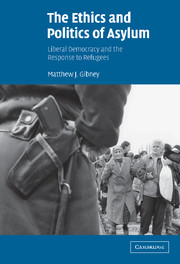Book contents
- Frontmatter
- Contents
- Acknowledgements
- Introduction
- 1 Partiality: community, citizenship and the defence of closure
- 2 Impartiality: freedom, equality and open borders
- 3 The Federal Republic of Germany: the rise and fall of a right to asylum
- 4 The United Kingdom: the value of asylum
- 5 The United States: the making and breaking of a refugee consensus
- 6 Australia: restricting asylum, resettling refugees
- 7 From ideal to non-ideal theory: reckoning with the state, politics and consequences
- 8 Liberal democratic states and ethically defensible asylum practices
- List of references
- Index
4 - The United Kingdom: the value of asylum
Published online by Cambridge University Press: 22 September 2009
- Frontmatter
- Contents
- Acknowledgements
- Introduction
- 1 Partiality: community, citizenship and the defence of closure
- 2 Impartiality: freedom, equality and open borders
- 3 The Federal Republic of Germany: the rise and fall of a right to asylum
- 4 The United Kingdom: the value of asylum
- 5 The United States: the making and breaking of a refugee consensus
- 6 Australia: restricting asylum, resettling refugees
- 7 From ideal to non-ideal theory: reckoning with the state, politics and consequences
- 8 Liberal democratic states and ethically defensible asylum practices
- List of references
- Index
Summary
[Britain has already experienced] a very considerable commotion [over immigration in the 1960s]. We've dealt with that problem and we don't wish to see it return.
Douglas Hurd, British Foreign Secretary 1992The UK is taking the lead in arguing for reform, not of the [Refugee] convention's values, but of how it operates.
Tony Blair, British Prime Minister 2001Only a few days ago I put a question to the Minister [Lord Rooker, Minister of State, Home Office] asking whether there was a legal way in which an asylum seeker could enter this country. He gave me a very blunt answer – ‘No’.
Lord Dholakia, House of Lords 2002In May 2002 The Guardian newspaper reported that British Prime Minister Tony Blair had ‘taken personal control of asylum policy’ and was considering a range of radical new options to reduce the number of asylum seekers arriving in the UK. These options included mobilising ‘Royal Navy warships to intercept people traffickers in the Mediterranean’ (The Guardian 2002a: 1) and pursuing a far more aggressive policy on deportation. Few watchers of political events in the UK since 1999 could have been completely surprised by this development. The question of how to reduce asylum applications has been a hot political issue in recent years: the focus of two comprehensive pieces of legislation (in 1999 and 2002) since the Blair government came to power in 1997, as well as a major issue in the 2001 national election.
- Type
- Chapter
- Information
- The Ethics and Politics of AsylumLiberal Democracy and the Response to Refugees, pp. 107 - 131Publisher: Cambridge University PressPrint publication year: 2004
- 1
- Cited by



